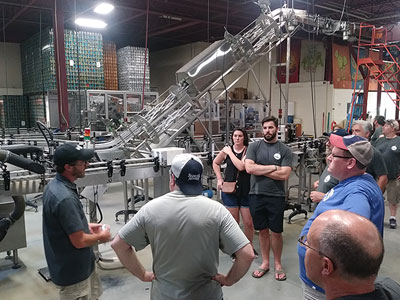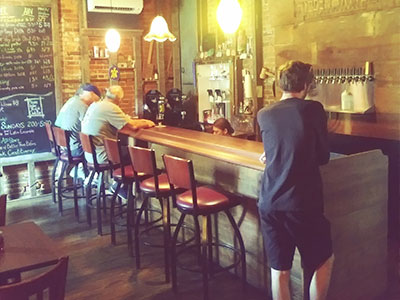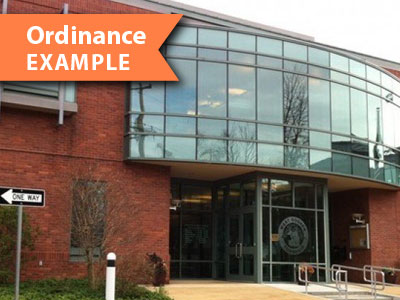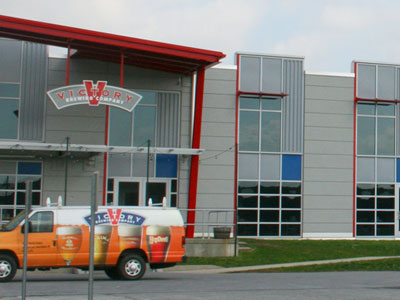Victory Brewing Company has several locations in Chester County, including this one in Parkesburg.
How it Works
Approximately 28 breweries were operating in Chester County as of 2019 with expected future growth. At both a national and county level, the craft brewing industry has grown over the past decade and continues to trend upwards. Pennsylvania is the top producer of craft beer by volume, has the sixth highest number of breweries in the country, and generated the second highest craft beer sales in the US in 2017. However, oftentimes municipal ordinances do not recognize breweries as a named use and do not adequately define types of breweries or their ancillary uses.
While breweries may present special challenges, municipalities that appropriately plan for breweries in their zoning ordinances, subdivision and land development ordinances, and design guidelines can receive multiple benefits. This tool is primarily geared towards smaller breweries or "craft breweries." Breweries producing more than 6 million barrels per year are not considered "craft" breweries and are classified "large" or "commercial" breweries.
Benefits
Economic Development
Breweries create new jobs both at the brewery as well as in associated industries. For many communities breweries have become destinations, drawing additional visitors and capital to their areas. Breweries can generate new taxes through sales, hotel/motel, property, and income taxes.
Food System Support
Breweries often partner with food trucks to provide food service, which creates opportunities for new business startups, jobs, and potential brick and mortar commercial restaurants. Additionally, breweries are increasingly using local ingredients for brewing beer and are often advocates for "farm to table" in food associated with their breweries.
Build Community
In many municipalities breweries have become gathering places that provide activities for all ages. These centers can create opportunities for interaction among all segments of the population and provide spaces for artistic activities.
Adaptive Reuse
Breweries' unique space needs can make building renovation financially feasible. Many breweries, both locally and globally, have preserved historic buildings, using the building character as a draw for customers.

Local breweries support economic development and tourism.
Get Started
Municipalities should first determine where they wish to permit breweries (by zoning district), how they wish to permit them (by-right, conditional use, special exception, as accessory uses), and any additional requirements (hours of operation, noise/outdoor dining, loading and unloading, etc.). Municipalities should consult with their solicitor about specific requirements of the PA Liquor Control Board and the Chester County Health Department with respect to brewery licensing and permits and associated food service licensing (such as restaurants or food trucks).
Municipalities should define and regulate each type of brewery appropriately. Individual brewery types may be better suited to different zoning districts depending on intensity. For example, a tasting room would typically have lower impact with regard to production, warehousing, waste, and deliveries and could appropriately be located on a historic main street. A regional brewery typically would need a larger facility and would primarily involve production, warehousing, and delivery/shipping, which may be more appropriate for higher intensity commercial or light industrial zones.
Regulatory provisions for breweries should address appropriate standards. Issues to be considered and addressed when developing regulatory standards include:
- How will various types of breweries be defined?
- Where will various types of breweries be permitted?
- Is there adequate availability for sewage disposal and water?
- What will the minimum parking provisions require?
- What operating hours will be permitted?
- What ancillary uses will be permitted?
Definitions
The following definitions are provided to provide context for and differentiation of the various potential types of breweries. They may be used as sample definitions for municipal ordinances:
Brewpub
An establishment used primarily for on-premises consumption of malt and brewed beverages produced on the premises or on real property immediately adjacent to the premises. A brewpub sells twenty five (25) percent or more of its beer on-site. A brewpub must be licensed by the Pennsylvania Liquor Control Board (or successor agency of the Commonwealth). Note: Brewpubs have a restaurant as a significant part of their operation and may or may not also bottle or can beer for on-site or off-site sales/distribution.
Microbrewery
A facility where not more than 15,000 barrels of malt or brewed beverages are produced on-premises on an annual basis and then sold or distributed for off-premises consumption, with seventy five (75) percent or more of its beer served off site. A microbrewery must be licensed by the Pennsylvania Liquor Control Board (or successor agency of the Commonwealth). Note: Microbreweries typically do not have a restaurant component but may have a tasting room as an accessory use.
Regional Brewery
A facility which produces more than 15,000 barrels but less than 6 million barrels of malt or brewed beverages are produced on-premises on an annual basis and then sold or distributed for off-premises consumption. A regional brewery must be licensed by the Pennsylvania Liquor Control Board (or successor agency of the Commonwealth). Note: Regional breweries typically do not have a restaurant component but may have a tasting room as an accessory use.
Beer Garden
An outdoor area, whether or not enclosed by a roof, and which is open to the elements, for the purpose of conducting outdoor sales and consumption of food and alcohol beverages, said outdoor area being directly attached to the licensed building, and used daily or on a seasonal basis as part of the normal operations of the licensed premises. Note: A beer garden may be a primary or accessory use and may or may not be associated with a brewery. Beer gardens may also be temporary "pop up" uses permitted by a municipal zoning ordinance, municipal code, or special/temporary permit.
Taproom
An establishment provided with special space and accommodations operated primarily for the sale by the glass for consumption on the premises of alcoholic liquors with the sale of food as a secondary object (distinguished from a Brewpub where the sale of food is a primary object). Note: A Taproom may or may not have on-site brewing involved; taprooms are typically associated with a micro or regional brewery located on-site or elsewhere. Taprooms may associate with a Food Truck to provide food service to patrons instead of having a kitchen or offering prepared foods.
Tasting Room
An accessory use to a brewery as a place for the consumption of beer produced onsite for the purpose of sampling for prospective purchase only. The quantity of any individual spirit, wine, and beer sample is not to exceed a limited number of ounces of beer (typically not more than four (4) oz servings and a limited number of servings).

Considerations
Infrastructure
Breweries (particularly a higher production regional brewery/microbrewery) can have impacts on the municipal water and sewer system in terms of water needed for brewing and the disposal of liquids after brewing. Gas and electric service can also be potential challenges for breweries. Breweries' deliveries and shipping may increase roadway use, waste and water disposal, and noise.
Warehousing/Storage
Breweries will need sufficient space for storing products for brewing (grains, malts, hops, etc.) in addition to cans, bottles, or kegs, and room to fill and store these products (depending on type). As a brewery becomes more successful, it may seek additional space for expansion.
Delivery/Shipping
Outside of tasting rooms, breweries may have impacts for deliveries and shipping of materials for brewing and production (cans, bottles, kegs). As breweries become more successful the size, scale, and frequency of deliveries/shipping may increase.
Location and Impacts on Adjacent Uses
There are potential impacts (crowds, noise, traffic, light) associated with some types of breweries that may affect where and how a municipality chooses to permit them. For example, limiting operating hours for certain activities (music, bands, games), particularly when they are permitted outdoors, should be considered in areas with nearby residential uses. In other cases, municipalities may impose regulations that unintentionally impact smaller scale breweries, such as exceptionally large setbacks between a brewpub and residential uses or districts. In general, commercial districts and downtown areas where restaurants are permitted would typically be appropriate for a brewpub. Ordinance standards need to be tailored according to the location and intensity of the specific use being regulated.
Historic Preservation
When located within an existing historic building, breweries should be sensitive to the building's character-defining features. Similarly, proposed buildings should be sensitive to their surrounding historic context. In both cases, sensitivity to the history of an area can improve the project's uniqueness as well as its success and marketability.

Examples
West Goshen Township Zoning Ordinance Section 84-8 includes definitions for "brewery" with sub-definitions for brewery pub and microbrewery. The township allows outdoor dining as an accessory use and specifies zoning districts for where these two uses are permitted. Section 84-57.26 contains Supplemental Regulations for Brewery Pubs and Microbreweries.
Kennett Square Borough Zoning Ordinance Section 27-7 includes definitions for "brewery" with sub-definitions for brewpub, craft brewery, microbrewery, nanobrewery, and regional brewery.
City of Ashville, NC Zoning Ordinance includes definitions, includes microbrewery and identifies it as a use in certain districts in addition to related accessory uses. The City also allows and regulates Food Trucks (Mobile Food Vending(Vendor).



